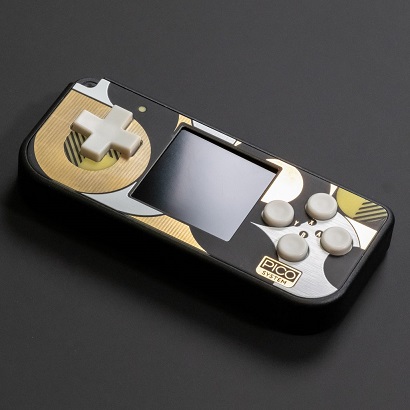¶ PicoSystem the tiny, hackable, RP2040 handheld!
PicoSystem is a pocket sized handheld games console, built around Raspberry Pi's RP2040 chip (that's the little fella that's the core of a Raspberry Pi Pico).
We've added a big chunk of flash memory, a vibrant 240x240 screen, a piezo speaker for retro bleeps and bloops, a rechargeable battery, and a nice D-pad and buttons picked out by our most particular arcade enthusiasts.
PicoSystem crams a whole heap of goodness into a tiny package:

- Powered by RP2040 Dual Cortex M0+.
- 264kB of SRAM.
- 16MB of QSPI flash supporting XiP.
- 1.54" 240x240 colour IPS LCD (ST7789 driver).
- D-pad and four action buttons.
- 525mAh LiPo battery (6hrs+ play time).
- Piezo speaker.
- On/off power button.
- RGB LED (user programmable).
- USB-C for programming and recharging .
- Machined aluminium case with FR4 front plate.
We also have a comprehensive guide to the the hardware which covers the full pinout of the RP2040 and other details.
Want to try it yourself? Buy a PicoSystem!
¶ Coding
PicoSystem can be programmed either with C++ or MicroPython - both options have their benefits and weaknesses! You can, of course, also load up games written by other people! Check out some of our favourites.
The PicoSystem API provides a set of base functionality for creating games. It is designed to be lightweight and get out of your way as much as possible. The entire API is exposed as around 40 functions which provide access to the hardware, drawing graphics, generating audio, and processing user input.
¶ Introduction
An overview of how the various subsystems on PicoSystem work.
- Basics: The fundamental building blocks of every PicoSystem project.
- Graphics: Pixel formats, buffers, blend modes, and more. Oh my.
- Audio: Discover more about how we generate those bleeps and bloops.
¶ C++
C++ gives you a faster and more memory lean environment to develop PicoSystem games.
- Getting started: Learn how to setup the PicoSystem development tools.
- Creating a project: Create and build a new project.
- Bulding the examples: Build and run our examples.
- API cheatsheet: A full list of the PicoSystem API methods.
¶ MicroPython
MicroPython provides a friendly environment ideal for beginners and experimentation.
- Getting started: Installing our PicoSystem MicroPython image and running your first program.
¶ Tools
These handy tools will help you prepare assets for your projects.
- Image converter: Convert your game artwork into the format used by PicoSystem and embed directly into your code.
- Font converter: Create fonts in your favourite image editor and convert them into PicoSystem format.